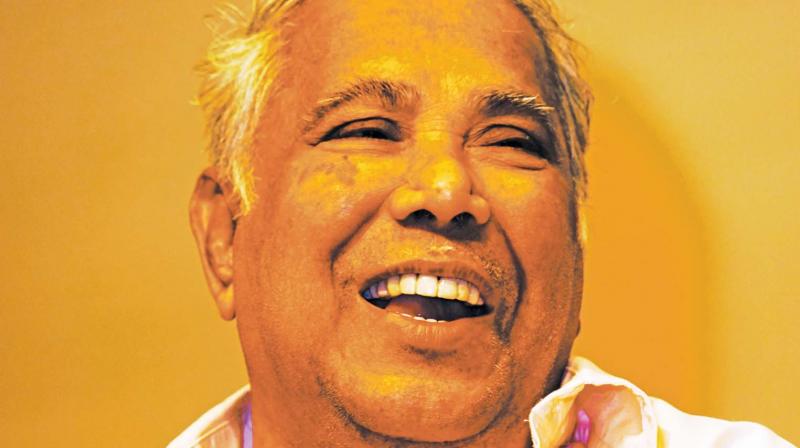Enough if info-box removed from George Hart’s paper: Avvai Natarajan
It is a warm-up ‘Q and A box’ at the beginning of the essay that seems to have created this misimpression.

CHENNAI: Amid the State School Education Minister, Mr. K. A. Sengottaiyan having appointed a committee to look into the “error” that has crept into a paper by leading Tamil and Sanskrit scholar Prof George L Hart’s paper included in this year State Board Plus-2 English textbook, titled, ‘The Status of Tamil as a Classical Language’, renowned Tamil scholar Dr Avvai Natarajan has said it will be wise to avoid comparative antiquity of classical languages.
“You should not have put the catalogue or the table assigning period to how old each of the classical language is (as part of the text),” which gives the suggestion that one language is older than the other, Dr Avvai Natarajan, a Padma Shree awardee for his contribution to Tamil language and culture and former secretary to the Government of Tamil Nadu, Department of Tamil Language, Development and Culture, said speaking to DC here on Thursday.
The paper by Prof George Hart, Professor of Tamil Language at the University of California, Berkley, had recently created a political storm with opposition parties led by Congress and DMK, demanding withdrawal of his paper from the ‘Plus-2’ textbook,
as the essay allegedly sought to belittle the antiquity of a great, classical language like Tamil by mentioning that Sanskrit was much older than Tamil.
Responding to DC’s queries on the issue that the controversy had arisen due to an “oversight”, as Prof Hart had basically discussed the status of Tamil as a classical language and the criterion for deciding a language as classical and how Tamil obviously qualified for it, Dr Natarajan was inclined to agree with that view.
“It is an oversight,” Dr Avvai Natarajan, also former vice-chancellor of the Tamil University, Thanjavur, said. When asked that Prof Hart was also not discussing the antiquity of each of the major classical languages of the world in that paper, Dr Natarajan said if there is no such mention in the text of the essay, “you just remove the table that mentions the antiquity of the classical languages; the other portions of the essay (Dr Hart’s piece) are well written.”
“I appreciate and congratulate the Education minister, Mr. K. A. Sengottaiyan for immediately responding to the issue; it shows his concern on a sensitive issue,” Dr Natarajan said.
It is a warm-up ‘Q and A box’ at the beginning of the essay that seems to have created this misimpression. It asks students to chronologically arrange the “languages” mentioned. The box mentions the languages in this order: “Chinese - 1,250 BC (BCE in today’s dating terminology), Hebrew-1,000 BC (BCE), Latin 75-BC (BCE), Tamil 300 BC (BCE), Greek- 1,500 BC (BCE), Sanskrit - 2,000 BC (BCE).”
“Such a catalogue or table was not necessary, comparing Tamil with other classical languages,” Dr Natarajan said. So, in the correction, it is enough if this table is removed and Prof Hart’s essay could be retained, the scholar noted.
Asked why such controversy arises, Dr Natarajan said for long years people here have reasons to believe that “Tamil is the oldest” language, as can be gleaned even from Tamil poet Manonmaniam Sundaranar’s poem, rendered as the ‘invocation song’ in Tamil Nadu government functions.
Emphasising the futility of comparing the antiquity of classical languages, as language is an emotional issue, Dr Natarajan said it would suffice to say that “Tamil is an ancient classical language, along with Sanskrit, Hebrew, Latin and the like. There ends the matter; but if you put a table like, comparing age of Tamil with other classical languages, then it becomes problematic.”
For the simple reason, Tamil as an ancient language, “is still a vibrant language spoken by millions of people; when that is the situation, people should be very careful and thoughtful as it is a sensitive matter. It is not advisable to compare the age of classical languages,” he added.
On the choice of Prof George Hart’s essay itself, Dr Natarajan said, the former is a “known authority” on Tamil. “He was honoured at the first Semmozhi conference in Coimbatore and in establishing the antiquity of Tamil, after Robert Caldwell we are now citing George Hart.”
Asked about political bias as accused by some opposition parties in including Prof Hart’s essay now, nearly 19 years after he had written it, Dr Avvai Natarajan said, “No; I don’t think the members of the Editorial Board (who prepared the English text) have any political bias. But they should be careful when they write anything about Tamil, because the pride of the language is the defining characteristic of the Tamil Nadu people.”
When former Chief Minister, M Karunanidhi was pressing for classical status’ for Tamil language, he wanted it exclusively for Tamil, given its unique position at the head of the family of Dravidian languages. But with the Central government having prescribed that a language should be 1,500 years old to qualify for the classical tag, now Malayalam, Kannada, Telugu and Oriya have also become classical languages, he underscored.
Dr Avvai Natarajan recalled in this context how the late Tamil scholar VG Surya Narayana Shastri, not only changed his name into Tamil as ‘Parithmaal Kalaignar’ due to his love for the classical language, but after having compared Sanskrit and Tamil, had “emphatically stated that Tamil is the oldest language.”
The ancientness and uniqueness of Tamil language and culture was not a commonly accepted view among Western scholars before that, Dr Natrajan pointed out, adding, “this awareness and appreciation among scholars in the West has come only in the last 50 years-to-60 years” after the DMK organised the first World Tamil Conference in Chennai.

